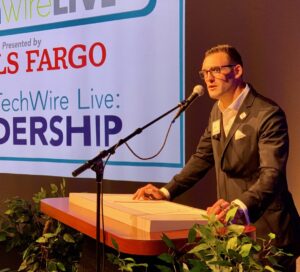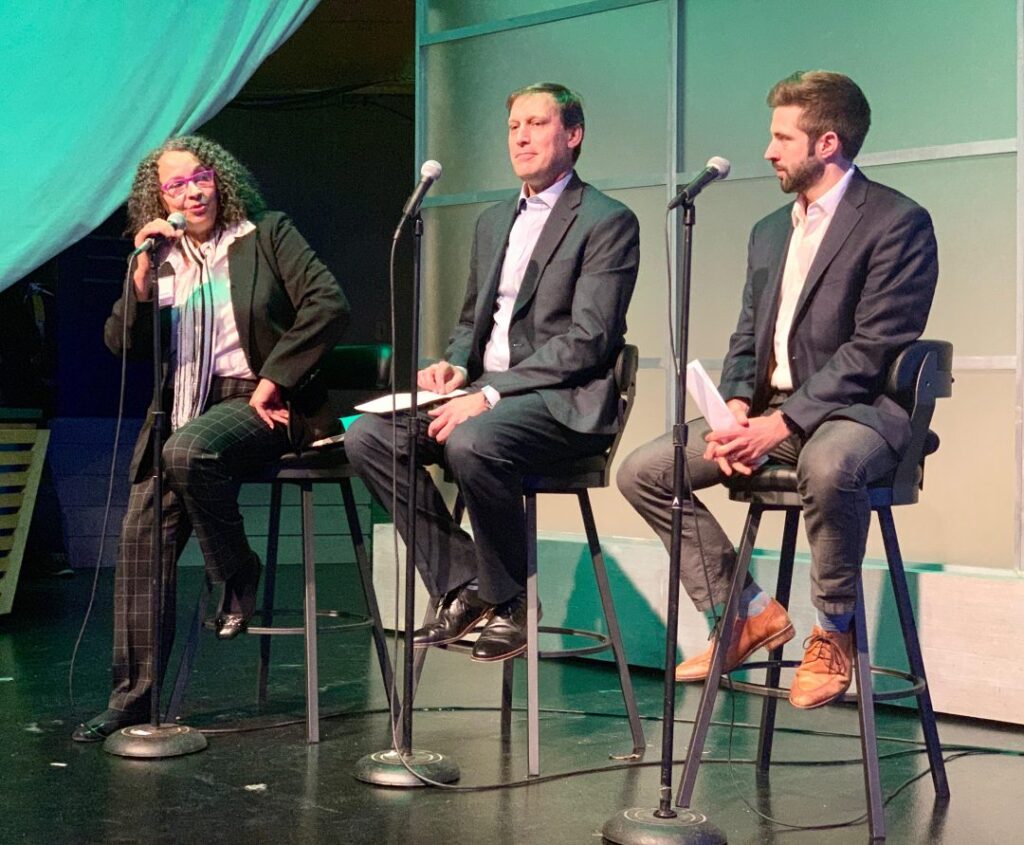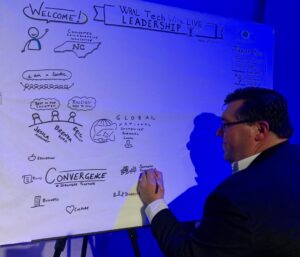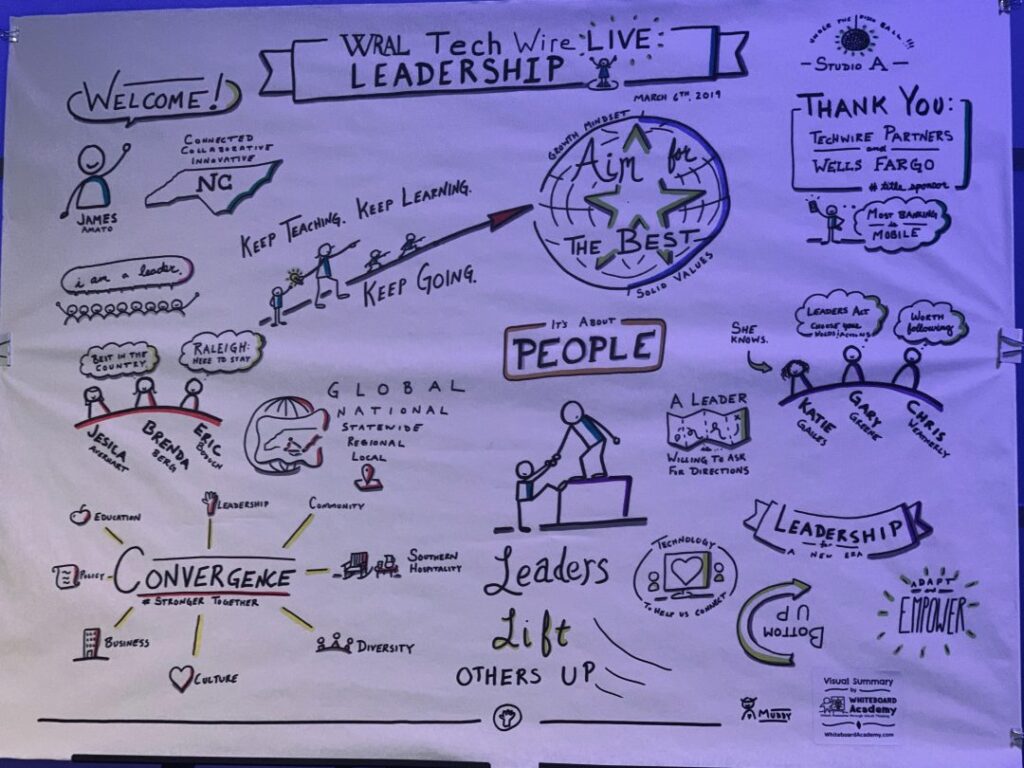 Leadership Triangle’s Jesica Averhart, Best NC’s CEO and president Brenda Berg and Pendo’s founder Eric Boduch at WRAL TechWire Live on Wednesday night.
Leadership Triangle’s Jesica Averhart, Best NC’s CEO and president Brenda Berg and Pendo’s founder Eric Boduch at WRAL TechWire Live on Wednesday night.
How to be a good leader post Amazon, Apple rejections?
by Chantal Allam
A bit of southern charm and perseverance.
That’s what it’s going to take to get over the hump and push through after the double-whammy rejection of Amazon and Apple, says Pendo’s cofounder Eric Boduch.
“There’s a little bit of that trough of disillusionment right now with Raleigh. But the assets are still here,” he told a sellout crowd gathered in WRAL-TV’s Studio A on Wednesday night for WRAL TechWire Live. “It’s still a great place to build and grow a company. The challenge is just persevering and not giving up.”
Boduch was speaking as part of a new quarterly event sponsored by Wells Fargo and with support from several TechWire partners that aims to coalesce industry experts around a central topic facing the region. Wednesday’s discussion centered on leadership, and how local businesses and leaders can strengthen the Triangle’s position as a great place to live and work.
 WRAL’s Strategy and Business Development manager James Amato making introductions at WRAL TechWire Live on Wednesday night.
WRAL’s Strategy and Business Development manager James Amato making introductions at WRAL TechWire Live on Wednesday night.
Boduch, who co-founded the fast-growing software startup with Todd Olson in 2013 right here in the Triangle, said he remains committed to the region – and so should other companies.
“We don’t need to be in San Francisco, and we’ve always thought that way. We’re super stoked to be headquartered here and growing the company in Raleigh,” he said.
Here are some other highlights:
LEAD WITH EDUCATION
With Leadership Triangle’s Jesica Averhart serving as moderator, Boduch shared the stage with Best NC’s CEO and president Brenda Berg.
As head of the non-profit coalition of business leaders committed to improving the state’s education system, Berg stressed the importance of leading through education.
“We have some of the lowest social mobility in the country right here in the Triangle area and Charlotte,” she said. “We’re playing a whole new ball game, and we’re not playing our entire team.”
 Leadership Triangle’s Jesica Averhart, Best NC’s CEO and president Brenda Berg and Pendo’s founder Eric Boduch.
Leadership Triangle’s Jesica Averhart, Best NC’s CEO and president Brenda Berg and Pendo’s founder Eric Boduch.
Among the more sobering statistics: “Three out of ten of our 15 year olds can’t do basic math. Which means you can’t pay your taxes, can’t read the newspaper,” she said. “We also paid our principals the lowest in the entire country until two years ago.”
The solution? Treat a school like a corporation, not a factory, and stop assigning beginner teachers to the most difficult class.
“Would you do that in any of your businesses? No. It just doesn’t make any sense,” she said. “But how do we really focus on leadership? Applying basic business, what’s kind of 1980s organizational structure of businesses to education, and being intentional about it.”
MAINTAINING CULTURE
Boduch emphasized the importance of maintaining a company’s culture for future success.
“Until you’re really through some of the high growth areas, you don’t understand how important it is,” he said. “There was one point Pendo went from four people to 30 in 45 days, which is kind of crazy if you thinking about it. Then you have all these people joining, and you’re like, okay, how do we make sure we instill the way of doing things that Pendo has?”
The answer: establishing a strong vision from the get-go.
“We’re really big into improving society’s experience with software. They understand that from the beginning. We also instilled our core values really early on.”
STAY ENGAGED
Being a good leader is also about staying engaged, said Gary Greene, founder of recruiting firm Greene Resources, who appeared on a second panel moderated by Wake Technical Community College’s Katie Gailes.
On this night, he certainly led by example.
He kept the audience amused by reciting a self-written poem and disclosing personal insights about his co-panelist, WRAL Digital Solutions’ Chris Weatherly, that he mined from the internet.
“He and his wife got married in 2015. They have one of the best group wedding photos you will ever see,” Greene said to a roar of laughter.
“There are so many ways that you can use technology to better your relationships with others,” he added. “Because of the immediacy and access to it, they expect the same from you. It’s so critical to our success in any position that we may have.”
 Wake Technical Community College’s Katie Gailes, Greene Resources’ Gary Greene and WRAL Digital Solutions’ Chris Weatherly.
Wake Technical Community College’s Katie Gailes, Greene Resources’ Gary Greene and WRAL Digital Solutions’ Chris Weatherly.
IS ANYBODY FOLLOWING YOU?
Weatherly joined the conversation by asking the simple question: “Is anybody following you?”
“Historically, leaders were the keepers of information,” he said. “They were the only ones that saw the big picture. If a challenge came up that involved multiple teams, it was difficult for the teams to come together and solve it, because nobody had all the information.”
That’s got to change, he said.
“You need to empower bottom-up decision making and solutions, instead of top to bottom. You’ve got to be able to have people with a shared understanding of the problem empowered to make the best decisions for the company.”
THE POWER OF VISUAL THINKING
Mike “Muddy” Schlegel, founder of Whiteboard Academy, spent the entire session creating a visual account of the panel discussions.
Armed with a black Sharpie marker and huge white canvas, he illustrated the speakers’ points as a strategy to “maximize audience engagement”.
 Mike “Muddy” Schlegel, founder of Whiteboard Academy, illustrating the discussion in real time.
Mike “Muddy” Schlegel, founder of Whiteboard Academy, illustrating the discussion in real time.
“This is a powerful business tool for strategic planning, visual thinking and problem solving,” said Schlegel, who founded the business as a side gig three years ago, and is now traveling around the country full time, helping leaders facilitate discussions.
“We’re on a mission to help others unlock awesome,” he said.
 Visual learning … the final product from WRAL TechWire Live.
Visual learning … the final product from WRAL TechWire Live.
Thanks to Chantal Allam and WRAL TechWire for this capcom story & for these capcom photos.